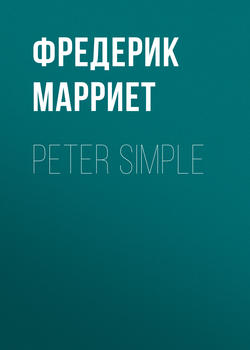Читать книгу Peter Simple - Фредерик Марриет - Страница 18
Chapter Eighteen
I go away on service, am wounded and taken prisoner with O’Brien—Diamond cut diamond between the O’Briens—Get into comfortable quarters—My first interview with Celeste
ОглавлениеAnd now I have to relate an event, which, young as I was at the time, will be found to have seriously affected me in after-life. How little do we know what to-morrow may bring forth! We had regained our station, and for some days had been standing off and on the coast, when one morning at daybreak, we found ourselves about four miles from the town of Cette, and a large convoy of vessels coming round a point. We made all sail in chase, and they anchored close in shore, under a battery, which we did not discover until it opened fire upon us. The shot struck the frigate two or three times, for the water was smooth, and the battery nearly level with it. The captain tacked the ship, and stood out again, until the boats were hoisted out, and all ready to pull on shore and storm the battery. O’Brien, who was the officer commanding the first cutter on service, was in his boat, and I again obtained permission from him to smuggle myself into it.
We ran on shore, amidst the fire of the gun-boats which protected the convoy, by which we lost three men, and made for the battery, which we took without opposition, the French artillerymen running out as we ran in. The first lieutenant, who commanded, desired O’Brien to remain with the first cutter, and after the armourer had spiked the guns, as officer of the boat he was to shove off immediately. O’Brien and I remained in the battery with the armourer, the boat’s crew being ordered down to the boat, to keep her afloat, and ready to shove off at a moment’s warning. We had spiked all the guns but one, when all of a sudden a volley of musketry was poured upon us, which killed the armourer and wounded me in the leg, above the knee. I fell down by O’Brien, who cried out, “By the powers! here they are, and one gun not spiked.” He jumped down, wrenched the hammer from the armourer’s hand, and seizing a nail from the bag, in a few moments he had spiked the gun. At this time I heard the tramping of the French soldiers advancing, when O’Brien threw away the hammer, and lifting me upon his shoulders, cried, “Come along, Peter, my boy,” and made for the boat as fast as he could; but he was too late; he had not got half-way to the boat, before he was collared by two French soldiers, and dragged back into the battery. The French troops then advanced, and kept up a smart fire; our cutter escaped, and joined the other boat, who had captured the gun-boats and convoy with little opposition. Our large boats had carronades mounted in their bows, and soon returned the fire with round and grape, which drove the French troops back into the battery, where they remained, popping at our men under cover, until most of the vessels were taken out: those which they could not man were burnt. In the meantime, O’Brien had been taken into the battery, with me on his back: but as soon as he was there, he laid me gently down, saying, “Peter, my boy, as long as you were under my charge, I’d carry you through thick and thin; but now that you are under the charge of these French beggars, why, let them carry you. Every man his own bundle, Peter, that’s fair play; so if they think you’re worth the carrying, let them bear the weight of ye.”
As soon as our boats were clear of their musketry, the commanding officer of the French troops examined the guns in the battery, with the hope of reaching them, and was very much annoyed to find that every one of them was spiked. “He’ll look sharper than a magpie before he finds a clear touch-hole, I expect,” said O’Brien, as he watched the officer. And here I must observe, that O’Brien showed great presence of mind in spiking the last gun; for had they had one gun to fire at our boats towing out the prizes, they must have done a great deal of mischief to them, and we should have lost a great many men; but in so doing, and in the attempt to save me, he sacrificed himself, and was taken prisoner. When the troops ceased firing, the commanding officer came up to O’Brien, and looking at him, said, “Officer?” to which O’Brien nodded his head. He then pointed to me—“Officer?” O’Brien nodded his head again, at which the French troops laughed, as O’Brien told me afterwards, because I was what they called an enfant, which means an infant. I was very stiff and faint, and could not walk. The officer who commanded the troops left a detachment in the battery, and prepared to return to Cette, from whence they came. O’Brien walked, and I was carried on three muskets by six of the French soldiers,—not a very pleasant conveyance at any time, but in my state excessively painful. However, I must say, that they were very kind to me, and put a great coat or something under my wounded leg, for I was in an agony, and fainted several times. At last they brought me some water to drink. O how delicious it was! In about an hour and a half, which appeared to me to be five days at the least, we arrived at the town of Cette, and I was taken up to the house of the officer who commanded the troops, and who had often looked at me as I was carried there from the battery, saying, “Pauvre enfant
